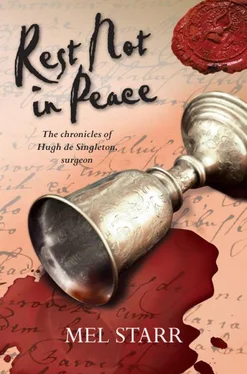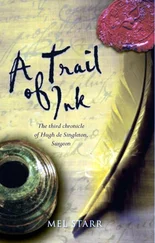Mel Starr - Rest Not in Peace
Здесь есть возможность читать онлайн «Mel Starr - Rest Not in Peace» весь текст электронной книги совершенно бесплатно (целиком полную версию без сокращений). В некоторых случаях можно слушать аудио, скачать через торрент в формате fb2 и присутствует краткое содержание. Год выпуска: 2013, Издательство: Lion Fiction, Жанр: Исторический детектив, на английском языке. Описание произведения, (предисловие) а так же отзывы посетителей доступны на портале библиотеки ЛибКат.
- Название:Rest Not in Peace
- Автор:
- Издательство:Lion Fiction
- Жанр:
- Год:2013
- ISBN:нет данных
- Рейтинг книги:4 / 5. Голосов: 1
-
Избранное:Добавить в избранное
- Отзывы:
-
Ваша оценка:
- 80
- 1
- 2
- 3
- 4
- 5
Rest Not in Peace: краткое содержание, описание и аннотация
Предлагаем к чтению аннотацию, описание, краткое содержание или предисловие (зависит от того, что написал сам автор книги «Rest Not in Peace»). Если вы не нашли необходимую информацию о книге — напишите в комментариях, мы постараемся отыскать её.
Rest Not in Peace — читать онлайн бесплатно полную книгу (весь текст) целиком
Ниже представлен текст книги, разбитый по страницам. Система сохранения места последней прочитанной страницы, позволяет с удобством читать онлайн бесплатно книгу «Rest Not in Peace», без необходимости каждый раз заново искать на чём Вы остановились. Поставьте закладку, и сможете в любой момент перейти на страницу, на которой закончили чтение.
Интервал:
Закладка:
“When did you last see Sir Henry alive?”
“Last night,” Sir John said.
“After the music and dancing,” Sir Geoffrey added. “We retired same time as Sir Henry and Lady Margery.”
“Did he seem well? Did any matter trouble him?”
The two knights seemed to hesitate, slightly, but I noted it, before they replied.
“Nay,” Sir Geoffrey said. “Lord Gilbert had musicians and jongleurs to entertain here in the hall after supper. Sir Henry danced an’ seemed pleased as any.”
“When he went to his chamber did he stand straight, or was he perhaps bent as if some discomfort afflicted his belly?”
Again the knights exchanged glances, but this time Sir John spoke with no hesitation. “Sir Henry always stands straight, being shorter than most men. Wears thick-soled shoes, too. Was he bent last eve we’d have noticed, that being unlike him.”
“Think back again to this morning, and when you first entered Sir Henry’s chamber. Was anything amiss, or in disarray?”
“When a man is found dead,” Sir John said, “other matters are trivial. I paid no heed to anything but the corpse.” Sir Geoffrey nodded in agreement.
I thanked the knights, bid them “Good day,” whether it was or not, and motioned to Lord Gilbert that I wished to speak privily to him.
“What have you learned?” he asked when we were out of Lady Margery’s hearing.
“You saw the corpse?” I asked.
“Aye,” he grimaced.
“Sir Henry’s eyes were open in death.”
“Aye, they were. What means that?”
“I do not know, but the fact troubles me.”
“Why so? You think violence was done to him?”
“Nay. I examined the corpse. I found no injury. If a man dies in his sleep, his eyes will be shut. I’m sure of this. If Sir Henry awoke, and felt himself in pain, he would, I think, have called out. But no man, nor Lady Margery, heard him do so.”
“The castle walls are thick,” Lord Gilbert said.
“As are the doors. But between the bottom of the door to Sir Henry’s chamber and the floor is a space as wide as a man’s finger is thick. If Sir Henry cried for help I think he would have been heard through the gap, unless the affliction had greatly weakened him.”
“Mayhap the malady took him of a sudden.”
“Perhaps,” I shrugged.
“You are not satisfied to be ignorant of a matter like this, are you?” Lord Gilbert said.
“Nay.”
“’Tis why I employed you. But you must remember that only the Lord Christ knows all. There are matters we mortals may never know.”
Lord Gilbert Talbot, baron of the realm, valiant knight, now theologian and philosopher.
“You wish me to abandon my inquiry?”
“The longer you continue, the more distress for Lady Margery. If you think it unlikely you will ever discover the cause ’twould be best to say so sooner than later. Men often die for no good reason.”
“There is always a reason, but other men are ignorant of understanding the cause.”
“And you do not like being deceived, even by death, do you?”
“Nay. And if I cannot discover what caused Sir Henry’s death, Lady Margery will tell all that ’twas my potion which did so.”
“Another hour or two, then. Have ready an opinion by dinner.”
I promised to do so. As I left the hall Sir Henry’s daughter entered, as red-eyed and puffy-cheeked as her stepmother. Lady Anne, I had been told, was Sir Henry’s daughter by his first wife, the Lady Goscelyna. The lass looked to be about nineteen or twenty years old, and was followed by two youths — squires, I remembered, to Sir Henry. The lads were somber, but showed no sign of terrible loss. Lady Anne is a beautiful maid, and surely accustomed to being followed by young men.
I returned to Sir Henry’s chamber, nodded to Arthur and Walter, and entered the room. Perhaps, I thought, murder was done here in some manner I had not discovered, and when Sir Henry was dead all marks of a struggle had been made right. But if such had happened, why did Sir Henry not shout for assistance when he was attacked? Whether the man died of some illness, or was murdered, I could make no sense of his silence.
I sat upon a chair, ready to abandon the loathsome task I had been assigned. The Lord Christ gives to all men their appointed tasks, but occasionally I wish that He had assigned another profession to me. My eyes fell upon the fireplace. It was cold, and the ashes of the last blaze of winter were long since disposed of, but ’twas not the hearth which seized my attention.
A poker stood propped against the stones, and my mind went to a rumor which passed among students while I studied at Balliol College. A rumor concerning the death of King Edward II. Mortimer and Edward’s faithless queen deposed him nearly a half-century past, and he was taken to Berkeley Castle where, some months later, he was found dead of a morning. Folk living near the castle were said to have heard terrible screams in the night, but, as with Sir Henry, no mark was found upon the King’s corpse to tell of violent death.
A red-hot poker, rumor said, was thrust up the deposed King’s rectum, doing murder and cauterizing the wound at the same time, so no blood flowed to disclose how the felony was done. And no visible wound was made to indict the murderers.
There had been no blaze in Sir Henry’s fireplace, but I went to the hearth to examine the poker nevertheless. The iron bar was dusty with ashes from its last use, which had been as was intended, not to do murder.
I replaced the poker against the wall, but the thought of Edward II’s death caused me to consider again Sir Henry’s corpse. Surely if a man was murdered as the King was, his screams would have been heard throughout the castle, stone walls and oaken doors notwithstanding.
But what if he was silenced with a pillow over his face? Would that muffle his shrieks? Or might a pillow have been enough to suffocate the man and silence his protest at the same time?
I turned to the door of the chamber to seek Arthur and Walter and conduct an experiment with the pillow. ’Twas then I saw the tiny brown droplet upon the planks. I knelt to inspect the mark, thinking at first it might have been made by a drop of Sir Henry’s wine. The color so matched the wood that ’tis a wonder I saw it at all. Some man, or men, did not.
The circular stain was smaller than the nail upon my little finger, and when I scraped a thumbnail across it I was able to lift some of the substance from the floor. Wine will not thicken so. A tiny drop of dried blood lay before me.
Could this be Sir Henry’s blood? If so, whence did it come? I approached the corpse, turned it upon the bed, and spread the legs so I might inspect the rectum for some sign of violence. I saw none, although I admit I might have performed the examination more carefully.
When Sir Henry was again upon his back I made another search of the corpse for some wound from which the drop of blood might have come. As before, I found none. Was there some other orifice of a man’s body whereby he might be stabbed and murdered, the wound invisible? I had already peered into Sir Henry’s mouth and seen nothing amiss. I tilted the head back and inspected the nostrils to see if any trace of blood was there. None was.
Sir Henry was stiff in death, but I managed to turn his head so that I could inspect his left ear. ’Tis all dark within a man’s ear, so at first I saw nothing, but it seemed to me that Sir Henry’s ear was darker than might be expected. I drew my dagger and with the point teased from the ear canal a flake of dried matter identical to the drop of dried blood upon the floor. If a man died in the throes of apoplexy would the strain cause an eardrum to burst? I had never heard of such a thing, and Galen and de Mondeville wrote nothing of such a phenomenon.
Читать дальшеИнтервал:
Закладка:
Похожие книги на «Rest Not in Peace»
Представляем Вашему вниманию похожие книги на «Rest Not in Peace» списком для выбора. Мы отобрали схожую по названию и смыслу литературу в надежде предоставить читателям больше вариантов отыскать новые, интересные, ещё непрочитанные произведения.
Обсуждение, отзывы о книге «Rest Not in Peace» и просто собственные мнения читателей. Оставьте ваши комментарии, напишите, что Вы думаете о произведении, его смысле или главных героях. Укажите что конкретно понравилось, а что нет, и почему Вы так считаете.












